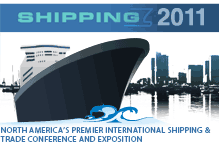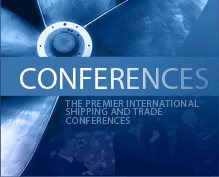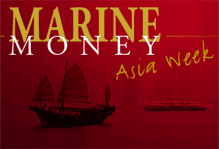
Bumi Armada Berhad: Banking on New Opportunities in a Challenging Climate
By Nora Huvane
The start of our Asia award period this year coincides almost perfectly with the collapse of Lehman brothers in September 2008. All of the capital markets have gone through a difficult twelve months, but it was arguably still the banks that were hardest hit. This was dramatically evidenced in the shipping industry. Figure 1 shows clearly the drop-off in total volume generally, and in new money specifically.
Almost as important as the change in volume has been the change in the character of the deals being done. Many new deals are ultimately “back to basics”, often bilateral loans (which aren’t presently counted by Dealogic) made to well-established relationship clients with strong balance sheets and active in sectors with relatively positive prospects. Loan to value ratios have moved closer to 50% or 60%, and spreads have moved significantly upwards. The increased cost accounts for both the increased cost of capital and the fact that without the rich fees provided by a vibrant syndication market, banks once again need to pay their bills and their employees the old-fashioned way – by making a spread on the loans currently in their portfolio rather than primarily through the generation of new business.
The other defining characteristic of the new bank market in shipping is the increasingly national character of the transactions being closed. Particularly in Europe, some banks have had to pull away from shipping even if it made sense from a business standpoint as taxpayer support for financial institutions is reasonably expected to translate into support from the financial institutions for domestic tax-paying companies and individuals. Meanwhile many of the Asian banks have remained closer to government policy all along. More importantly in China, Japan and Korea, and in Singapore as well, shipping and shipbuilding are important national industries that bring in tax revenue and also employ tens of thousands.
Investing and Investment Banking
The market is depressed. The people are not.
The debt markets exist. But you are looking at a lot less for a short term costing a lot more. A lot of the banks will be properly back into the game by 2010. It will help to have companies based in ship finance exporting countries.
The capital markets exist. The bond market is open at very reasonable rates. The equity markets are open for existing issuers but valuations are poor.
We may have a rebound this year thanks to stimulus plans and fiscal loosening, but the underlying damage is done. Banks will eventually HAVE to account for their losses. The write-downs have to come from somewhere and government debt is hardly the answer. Unless they wait years with the balance sheets impaired.
Continue Reading
Where the Sun Never Sets
Nora Huvane was kind enough to file the following report from Oslo:
The mood in Oslo today largely matched the weather. A bit wet and chilly for June, but there were some sunspots and hope is high that fairer weather will return. The hearty and well-prepared will survive and prosper regardless – so if you’re planning any investments in shipping, be sure to pack your umbrella.
Marine Money’s 11th annual Norway Ship & Offshore Forum, held with partners DnB NOR and Nordea and in conjunction with Nor Shipping, focused largely on the offshore markets and outlooks. Respected analysts reviewed outlooks for the oil market, drilling, FPSO and FSO and offshore support vessel markets. While there were concerns about oversupply and short-term mismatches in E&P budgets and industry capacity, the general consensus is that long-term fundamentals remain what they have been safely out of the reach of traders, speculators and gamblers and in the long-range budget planning and price targets of well established oil companies. The world population and economy will continue to grow over the long-term, and until a suitable alternative for oil is found so will oil demand growth. Gavin Strachan of ODS Petrodata pointed out that the oil price drop came as 2009 E&P budgets were being set, making oil price irrelevant for the offshore market in the short-term, over the longer term supply depletion on the order of 9% pa without further investment will ultimately drive demand for the offshore industry.
Continue Reading
Tidbits from Hong Kong
“Nothing in Life is to be Feared, it is only to be understood. Now is the time to understand more, so that we may fear less” Marie Curie, as quoted by Raghu Narain
We’ve had a lot of talk at our conferences lately about survival tools for the current market, whether these be bringing down costs, managing vessels properly, working out loans, hedging risks or any other manner of prudent activity. But we may, arguably, have left out the most important one: a sense of humor. And through the pessimism that pervaded our conference in Hong Kong, as we’re fairly sure pervades any rational discussion about prospects for ship finance, it was this persistent good humor that allowed owners, bankers, lawyers and analysts to get up and discuss openly the present situation and the pain that is still to come. It allowed them to engage one another on contentious topics to form realistic assessments and strategies. It allowed them to answer hard questions and make unpleasant predictions. In short, it allowed them to face the reality of the present crisis, and that together with a constant search for the understanding described by Marie Curie is very likely the little secret behind their resiliency to date.
Contributing significantly to this understanding was opening speaker Louis-Vincent Gave of GaveKal, a financial services firm that offers institutional investors and high net worth individuals fund management, independent research on global macro-economic trends and events, and independent advisory work on China and its impact on the global economy. Continue Reading
Navigating Rough Waters: Survival Today, Success Tomorrow
Did you know…
· Half of shipping bankers answering a survey last week would be comfortable financing a newbuild tanker…but 0% would be comfortable with a newbuild containership,
· 70% of these bankers expect shipping loan spreads to average over 300 basis points going forward…more than a third of these expect spreads to average over 400 basis points,
· 88% typically rely on LTV covenants – and half anticipate taking write-offs in 2009? Continue Reading
Yujin International Goes to London
If there’s one thing that’s receded into the distant past, it’s the boom of shipping IPOs. A product of highly liquid capital markets and robust shipping markets, those days already command a bit of nostalgia even as we pay dearly for their excesses. As large operations with major ships plied the major international exchanges, a few smaller deals got through, most notably on the London AIM (Alternative Investment Market). One of these has already been privatized but a couple quietly remain.
It was rather unexpected, however, to see Singapore-based bunkering company Yujin International announce admission to the London AIM this month in a deal organized by nominated advisor and broker Seymour Pierce.
The company listed with 30,000 shares priced at GBP 0.33 each, making its total market capitalization after expenses just shy of GBP 10 million. Of this amount, Company Director and Joint Managing Director Captain Joseph Ting Siew Chiong holds 18%, while Company Director and Joint Managing Director Captain Liew Chin Chye holds another 18%. Non-Executive Chairman Lee Keen Whye and Company Director and CFO Lim Kay Yi Bernard hold another 2.92%, while primary shareholder Kavita Capital holds 51.3%. You don’t need a calculator to tell you this doesn’t leave much in public hands – less than 10% or GBP 1 million. Continue Reading
Seaspan Supporters Step Up
The most recent illustration of this phenomenon has come from Seaspan (NYSE:SSW)’s backers. Co-founder Dennis Washington issued a statement saying: “I believe strongly in the financial model of Seaspan Corporation. The Company has a very modern fleet, prestigious customers and a strong management team. The Company is well-positioned to take advantage of opportunities that may arise in the future.” Then he put his money where his mouth is with the announcement of a $200 million issue of preferred equity.
The company last week announced an agreement to issue and sell Series A Preferred Stock to Dennis, Kevin and Kyle Washington and Graham Porter through respective affiliates. Dennis Washington will be investing $140 million and the others an aggregate of $60 million. Continue Reading
Moments of Truth
One of the great things about the current financial crisis is that it’s clearing away some of the rot created during the good times and allowing the creation of a more solid foundation for future business. One of the clearest barometers of this is how the recently-public companies are reacting to current conditions, behaviors that clearly indicate the difference between simply legality and ethics, as well as a simple lack of foresight.
Though we understand the systems of private equity and public investment, and that investors are driven by their time horizon, be that one day, five days or five years, on behalf of the system we also regret the disassociation of short-term actions and long-term effects on organizations, where all activities are justified based on the value they appear to create in a specified timeframe, even if that value was in actuality borrowed from the future at a very high price. Continue Reading
Pacific Basin Finds Convertible Value – Public Debt Award
By Nora Huvane
The last year has hardly been a bumper one for shipping and offshore bonds. Compared to the number of issues in the Oslo market alone prior to the strike of the credit crunch, it has been downright dour. However of what activity did exist, around half occurred in various markets across Asia. Those shipping companies that have a history of capital markets activity effectively used the bond market to fund their growth and capital requirements, including Berlian Laju Tankers, Noble Group, Titan and Pacific Basin.
Some companies, like Berlian Laju Tankers, were able to get their offerings in the door before the credit crunch hit in late July 2007. BLT issued a total of four bonds in 2007 running the gamut from IDR issues with local banks to USD issues with global banks in an impressive financing program that both refinanced existing debt and paved the way for its momentous acquisition of Chembulk.
Shipping Banker Survey
By Nora Huvane
It can be a treacherous thing to be a shipping banker during good times.
After all, ship finance is a much more complex science than shipowning. In shipowning, when the market is strong, owners make money and when the market is weak, many of them blow up. It is life in the food chain in its simplest form.
At least anecdotally, ship finance is influenced by a unique set of fundamentals. When the shipping markets are strong for a prolonged period, shipowners don’t need their bankers. When this is coupled with the fact that all kinds of new money is floods into the industry at a high point in the cycle, loan margins go down and covenants loosen – all at a time when cash flows are at or near peaking, asset values are inflated and the risk is higher. Just like the high interest rates charged to companies in default, it seems the cost of debt is lowest when borrowers are in the best position to pay.
So life is good for the shipowners; 2004 logged in as one of the most profitable years ever, and the future looks pretty good also. Charter rates are high, interest rates are low and the fundamentals support continued prosperity and profitability, though perhaps in a slightly more sober environment. Continue Reading







